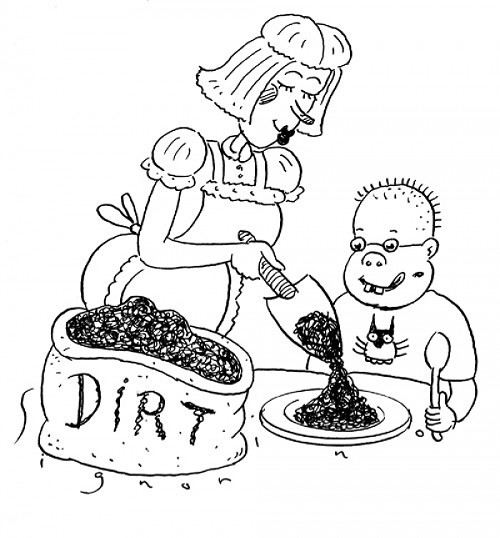Why do we have allergic reactions? What use do allergies serve? I can’t imagine any Darwinian advantage. I can’t see being a successful mastodon hunter with sneezing and hacking giving away your position. Don’t get me started on trying to woo a female with things that are meant to be dry being moist and things that are meant to be moist being dry and itchy. —Sneezy
You ingrate. Sure, a runny nose doesn’t do much for your sex appeal. But if it weren’t for allergies, or at least for the physiological mechanism that gives rise to them, you’d be dead.
Allergies are an overzealous version of the chain of events that enables your body to defend itself against foreign invaders such as parasites, protozoans, bacteria and viruses. Thinking it’s under attack, a type of white blood cell in your body produces immunoglobulin E (IgE) antibodies. These antibodies latch onto other cells and encourage them to release histamine and other inflammatory chemicals, a hyperallergenic response sometimes called atopy. Result: the usual allergic symptoms and a rush for the Benadryl.
Inconvenient? Sure. But what would you rather do, be a doormat for bacteria, or sneeze? About 1 in 5 people in the developed world suffers from at least one allergy. Lucky is the sufferer who’s allergic to just one thing. For example, sensitivity to ragweed or birch pollen can induce food allergies due to cross-reactions between the pollen and similar food proteins, such as those found in apples.
Why are some people oversensitive? Because, to put the most positive spin on it, they’re better at recognizing tiny amounts of potentially harmful substances and mobilizing a white-blood-cell smackdown. This process has developed over millions of years and works well overall, leading some researchers to term our immune system—even in
hyperactive mode—one of the greatest success stories of evolution.
The problem is that it takes your immune system a while to learn what’s harmful and what’s not, mainly by being exposed to enough of the benign substance over time. That’s how allergy shots work: giving you gradually larger amounts of allergens to desensitize you.
This takes us to the so-called hygiene hypothesis, discussed here in the past. In our sterile modern world, exposure to allergens when young, a critical time for training the immune system, has been greatly reduced. Fewer chronic infections and parasites have also limited our ability to adapt to allergens. The hygiene hypothesis hasn’t been proven, largely because the genetic and biological factors behind allergies remain poorly understood. However, there’s reason to think you’d have fewer allergies now if as a kid you’d spent more time living in filth.
Many studies indicate spending time on a farm during childhood reduces the likelihood of allergies, especially hanging around farm animals and stables. Drinking unprocessed milk may also help. For nonfarmers, there seems to be a relationship between allergy incidence and the cleanliness of your living conditions. A German study found children who slept on dirty—sometimes filthy—mattresses were much less likely to suffer from hay fever and allergies, a protective effect seen in both farming and nonfarming households. Children and mothers living in the less industrialized Russian part of the northern European region of Karelia had substantially fewer allergies than their more westernized Karelian neighbors in Finland, possibly due to greater exposure to microbes in soil and water.
A Mongolian study found those living closer to the soil in small villages had fewer allergies than those living in towns and cities. One multicountry European study found that microbial exposure while in the womb could help prevent development of allergies. Chinese researchers found urban children were more than three times as likely to have asthma or allergies than rural kids, especially those exposed to livestock or farming. This is true even after accounting for the possibility of “healthy farmer effect”—i.e., the tendency for those who are too allergic for farm life to leave while sturdier folks remain. Urban Chinese children were almost nine times more likely to be allergic to cats than their rural cousins.
There’s evidence early exposure can reduce allergic sensitivity to the dreaded peanut. A study comparing Jewish kids in Israel and the U.K. found a clear inverse relationship between early peanut consumption and occurrence of peanut allergies, even after genetics and socioeconomic considerations were factored out. Another study concluded high levels of peanut exposure during infancy were bad, but modest levels could desensitize protectively.
Though we can’t yet say why with certainty, it seems evident allergies are on the rise in the industrialized world. Long-term studies in Denmark, the U.K., Japan and other countries have found significant increases in allergy complaints. One bright spot: Allergies in France may be leveling off. Is it exposure to earthy French cuisine? No idea, but in an age of helicopter parenting, it’s tempting to think the best defense against allergies may be early-childhood contact with good old-fashioned dirt.
Send questions to Cecil via StraightDope.com or write him c/o Chicago Reader, 11 E. Illinois, Chicago 60611. Subscribe to the Straight Dope podcast at the iTunes Store.
More by Cecil Adams
-
This Is the End, My Friend
This week's Straight Dope marks the last appearance of the column as the Teeming Millions have known it for the past 45 years.
- Jul 11, 2018
-
Do Brain Supplements Do Anything?
Brain Drain
- Jul 4, 2018
-
Is flying really worse for the environment than driving?
Planes and Trains
- Jun 27, 2018
- More »




